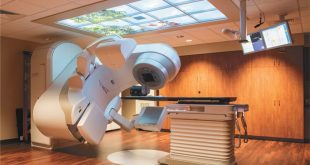By Ravi Chandra, MD, FRCS – The Vein Center of North Florida
 Pelvic Congestion Syndrome (PCS) is a chronic condition that causes pain to the pelvis, a condition prevalent among the female population. When left untreated this
Pelvic Congestion Syndrome (PCS) is a chronic condition that causes pain to the pelvis, a condition prevalent among the female population. When left untreated this
condition can potentially lead to significant debilitating symptoms. Pelvic Congestion Syndrome occurs when ovarian or pelvic veins become dilated and enlarged, therefore creating incompetent veins. These diseased veins cause retrograde flow of blood in the pelvis, causing increased amount of blood in the veins, thus leading to increased pressure and congestion in the pelvic region. Pelvic Congestion Syndrome can result in a range of symptoms, including:
• Dull, aching or “dragging” pain in the pelvis or lower back, particularly on standing and worse around the time of your menstrual period.
• Bloating
• Irritable bladder that sometimes leads to stress incontinence
• Irritable bowel (recurrent abdominal pain and diarrhea alternating with periods of constipation)
• Deep dyspareunia (discomfort during or after sexual intercourse)
• Vaginal or vulvar varicose veins (bulging veins around the front passage)
• Varicose veins of the top of the inner thighs or back of the thighs
PCS can be challenging to diagnose and treat, but with the right approach, most patients can find relief from their symptoms.
One of the primary risk factors for PCS is hormonal changes. Fluctuations in estrogen levels can cause the veins in the pelvis to dilate and become more susceptible to reflux. This is why PCS is more common in women than in men and is often associated with pregnancy, menstruation, and menopause.
Other risk factors for PCS include a family history of the condition, obesity, and a sedentary lifestyle. Obesity can increase pressure on the veins, leading to reflux and congestion. A sedentary lifestyle can also contribute to PCS by reducing blood flow and weakening the muscles that support the veins.
To help prevent Pelvic Congestion Syndrome, it is essential to maintain a healthy lifestyle. This includes regular exercise, maintaining a healthy weight, and eating a balanced diet. Avoiding prolonged periods of sitting or standing can also help prevent PCS. For those who sit for long periods, taking breaks to stand up and move around can help improve circulation and reduce the risk of PCS.
For women, taking hormonal contraceptives can help regulate estrogen levels and reduce the risk of PCS. Women who are pregnant or have recently given birth should speak with their healthcare provider about any potential risk factors for PCS and ways to prevent the condition.
The Vein Center of North Florida provides a treatment option for Pelvic Congestion Syndrome that aims to alleviate its debilitating symptoms. This option involves pelvic Venography, a minimally invasive procedure that not only diagnoses but also treats the condition. Our skilled vascular surgeons carry out this procedure in our on-site vascular laboratory. During the Venography procedure, a catheter is introduced into the venous system either from the groin or neck, and contrast dye is subsequently administered into the veins of the pelvis. This enhances the clarity of the X-ray images of the veins, enabling the healthcare provider to identify any blockages or other issues that may be contributing to PCS symptoms. Once the underlying cause of PCS is identified, our physicians proceed to employ stent intervention to treat the affected veins. Patients receive follow-up care at our facility, and their progress is closely monitored by our staff of highly trained vein professionals.
Overall, pelvic Venography treatment is considered to be a highly effective treatment option for Pelvic Congestion Syndrome. This minimally invasive procedure helps diagnose and treat the condition, allowing patients to find relief from their symptoms and improve their quality of life. If you are experiencing symptoms of PCS, speak with your healthcare provider about whether Venography may be right for you.
The Leaders in Comprehensive Vein Care Ravi Chandra, MD, FRCS
Ocala’s leading vascular surgeon, Dr. Ravi Chandra, is the only local surgeon certified by the American Board of Surgery, the American Board of Phlebology, and the American Board of Vascular Medicine as a diplomat in Endo-Vascular medicine. Dr. Ravi Chandra leads a team of medical professionals who take a personalized approach with each patient. The Vein Center of North Florida’s staff takes their time to listen to patient concerns and develop a customized treatment plan to address each patient’s medical concerns. Our goal is to perform the safest and least invasive procedure possible and get you back to living life at its fullest!
Patricia Hurst is a Board
Certified Nurse Practitioner earning her Master’s Degree at the University of South Alabama. She has worked with Dr. Chandra and the SSO team for more than 20 years. She sees patients in the office, hospitals and has extensive training assisting in the operating room. She earned a certificate of first assisting from the National Institute of First Assisting (NIFA) and became a Certified Perioperative Nurse (CNOR) as a commitment to providing quality care for her patients during their surgical experience. Patty was raised in Ocala and takes great pride in serving her local community. She enjoys spending time with her family, and antique shopping.
The Vein Center of North Florida
1920 SW 20th Place, Suite #201
Ocala, Florida 34471
352-237-1820
www.veincenternorthflorida.com
 Central Florida Health and Wellness Magazine Health and Wellness Articles of the Villages
Central Florida Health and Wellness Magazine Health and Wellness Articles of the Villages



